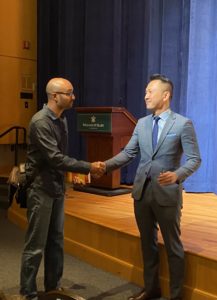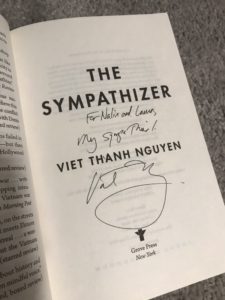I recently had the wonderful opportunity to hear Pulitzer Prize winning author Viet Thanh Nguyen speak at the College of William and Mary for the 2022 McSwain-Walker Lecture. His talk was entitled “Refugees, Language, and the Meaning of ‘America’“. Nguyen wrote the novel The Sympathizer, and was also a guest on my favorite podcast, Throughline, in the episode entitled All Wars Are Fought Twice (worth a listen… or maybe two!).
I took away so many insights from Dr. Nguyen’s talk, in which he – a Vietnamese American – referred to being “split in two” by the duality of how the Vietnam War is remembered by Vietnamese and by Americans, and finding himself in neither narrative. Both vantage points, he remarked, “want to believe only in their own humanity.”
The persistent anchoring in our own constructed memories and shared narratives about nation, identity, and what constitutes ‘us’ and ‘them’, and then the conflict which occurs when these constructs collide against the views of others, are persistent motifs in Nguyen’s fiction and lectures.
The feeling of being caught between two worlds but part of neither, and yet craving earnestly to be “wholly inside” in Nguyen’s terms, is a primary inner conflict for one of the main characters in my novel in progress, tentatively entitled Rassam’s Eye. Nimasha Vaas grew up on a highly technologically advanced planet in the neurally-augmented Dharumi Hegemony. She returns to the remote backwater planet on which she was born, Iskaria, while the build up to an interstellar war threatens to close in around her.
It was an inspiration and an honor to have the opportunity to listen to and meet Dr. Nguyen. I have not yet read his book; but now that I have a signed copy, I might have to bump it higher on my list! I will say, the Throughline episode I linked above is a great one, and one I’ve listened to at least twice. I’d strongly recommend it as an access point to Nguyen’s perspective and ideas.


The book sounds interesting. In college (50 years ago) was when I first realized different countries tell history through their own cultural lens To explore my premise, I bought a suitcase full of books while traveling in Russia on their view of America vs USSR history. Predictably, very different. So, I guess I’m not surprised though in Nguyen’s case, we were allies. We might have been more aligned.